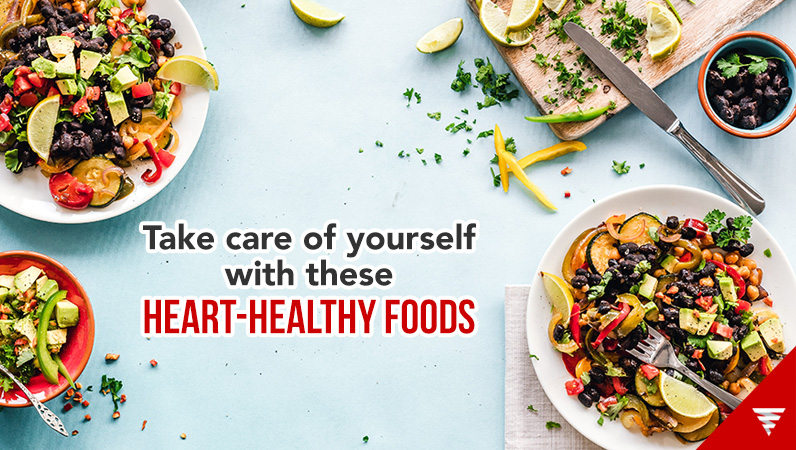Heart disease accounts for nearly one-third of all deaths worldwide. Diet plays a major role in heart health and can impact your risk of heart disease. In fact, certain foods can influence blood pressure, triglycerides, cholesterol levels and inflammation, all of which are risk factors for heart disease.
Here are some foods that you should be eating to maximise your heart health.
1. Leafy Green Vegetables
Leafy green vegetables like spinach and kale are well-known for their wealth of vitamins, minerals and antioxidants. In particular, they’re a great source of vitamin K, which helps protect your arteries and promote proper blood clotting. They’re also high in dietary nitrates, which have been shown to reduce blood pressure, decrease arterial stiffness and improve the function of cells lining the blood vessels.
2. Whole Grains
Whole grains include all three nutrient-rich parts of the grain: germ, endosperm and bran. Common types of whole grains include whole wheat, brown rice, oats, rye, barley, buckwheat and quinoa. Compared to refined grains, whole grains are higher in fiber, which may help reduce “bad” LDL cholesterol and decrease the risk of heart disease.
When purchasing whole grains, make sure to read the ingredients label carefully. Phrases like “whole grain” or “whole wheat” indicate a whole-grain product, while words like “wheat flour” or “multigrain” may not.
3. Berries
Strawberries, blueberries, blackberries and raspberries are jam-packed with important nutrients that play a central role in heart health. Berries are also rich in antioxidants like anthocyanin, which protect against the oxidative stress and inflammation that contribute to the development of heart disease.
Berries can be a satisfying snack or delicious low-calorie dessert. Try adding a few different types to your diet to take advantage of their unique health benefits.
4. Avocados
Avocados are an excellent source of heart-healthy monounsaturated fats, which have been linked to reduced levels of cholesterol and a lower risk of heart disease. Avocados are also rich in potassium, a nutrient that’s essential to heart health. In fact, just one avocado supplies a bit more than 900 milligrams of potassium, or around 30% of the amount that you need in a day.
5. Fatty Fish and Fish Oil
Fatty fish like salmon, mackerel, sardines and tuna are loaded with omega-3 fatty acids, which have been studied extensively for their heart-health benefits.
If you don’t eat much seafood, fish oil is another option for getting your daily dose of omega-3 fatty acids. Fish oil supplements have been shown to reduce blood triglycerides, improve arterial function and decrease blood pressure. Other omega-3 supplements like krill oil or algal oil are popular alternatives.
6. Walnuts
Walnuts are a great source of fiber and micronutrients like magnesium, copper and manganese and can help reduce cholesterol and blood pressure and may be associated with a lower risk of heart disease.
7. Beans
Beans contain resistant starch, which resists digestion and is fermented by the beneficial bacteria in your gut. Eating beans has been linked to reduced blood pressure and inflammation, both of which are risk factors for heart disease.
8. Dark Chocolate
Dark chocolate is rich in antioxidants like flavonoids, which can help boost heart health. Additionally, chocolate can be high in sugar and calories, which can negate many of its health-promoting properties.
Be sure to pick a high-quality dark chocolate with a cocoa content of at least 70%, and moderate your intake to make the most of its heart-healthy benefits.
9. Tomatoes
Tomatoes are loaded with lycopene, a natural plant pigment with powerful antioxidant properties and have been associated with a lower risk of heart disease and stroke, as well as an increase in “good” HDL cholesterol. Antioxidants help neutralise harmful free radicals, preventing oxidative damage and inflammation, both of which can contribute to heart disease.
10. Almonds
Almonds are incredibly nutrient-dense, boasting a long list of vitamins and minerals that are crucial to heart health. They’re also a good source of heart-healthy monounsaturated fats and fiber, two important nutrients that can help protect against heart disease.
Remember that while almonds are very high in nutrients, they’re also high in calories. Measure your portions and moderate your intake if you’re trying to lose weight.
11. Seeds
Chia seeds, flaxseeds and hemp seeds are all great sources of heart-healthy nutrients, including fiber and omega-3 fatty acids. Adding seeds to your diet can improve many heart disease risk factors, including inflammation, blood pressure, cholesterol and triglycerides.
For example, hemp seeds are high in arginine, an amino acid that has been associated with reduced blood levels of certain inflammatory markers while flaxseed may help keep blood pressure and cholesterol levels under control.
12. Garlic
For centuries, garlic has been used as a natural remedy to treat a variety of ailments. In recent years, research has confirmed its potent medicinal properties and found that garlic can even help improve heart health. This is thanks to the presence of a compound called allicin, which is believed to have a multitude of therapeutic effects.
Be sure to consume garlic raw, or crush it and let it sit for a few minutes before cooking. This allows for the formation of allicin, maximizing its potential health benefits.
13. Olive Oil
A staple in the Mediterranean diet, the heart-healthy benefits of olive oil are well documented. Olive oil is packed with antioxidants, which can relieve inflammation and decrease the risk of chronic disease. It’s also rich in monounsaturated fatty acids, and many studies have associated it with improvements in heart health.
Take advantage of the many benefits of olive oil by drizzling it over cooked dishes or adding it to vinaigrettes and sauces.
14. Edamame
Edamame is an immature soybean frequently found in Asian cuisine. Like other soy products, edamame is rich in soy isoflavones, a type of flavonoid that may help lower cholesterol levels and improve heart health. Edamame also contains fiber and antioxidants, which can also benefit heart health.
15. Green Tea
Green tea has been associated with a number of health benefits, from increased fat burning to improved insulin sensitivity and it has been associated with lower cholesterol, triglycerides and blood pressure.
Taking a green tea supplement or drinking matcha, a beverage that is similar to green tea but made with the whole tea leaf, may also benefit heart health.

Julio Gutierrez is the founder and Head Coach of Hurricane Fitness. His love for the deadlift is almost as big as his love of pop culture.

